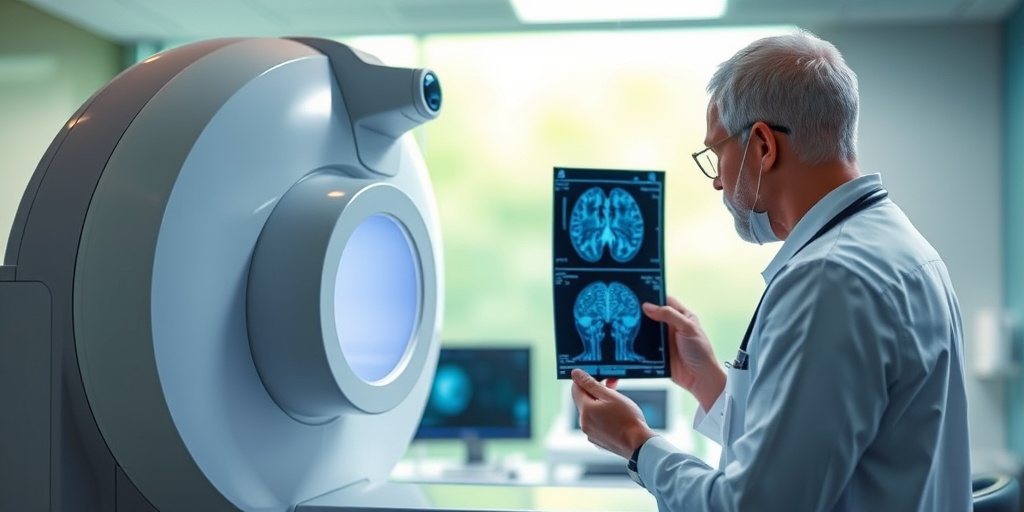What Is Agenesis of Corpus Callosum?
Agenesis of Corpus Callosum (ACC) is a rare neurological condition characterized by the partial or complete absence of the corpus callosum, the structure that connects the left and right hemispheres of the brain. This crucial bridge facilitates communication between the two sides, allowing for coordinated brain function. When this structure is absent, it can lead to a variety of developmental and cognitive challenges.
ACC can occur as an isolated condition or as part of a syndrome that includes other brain malformations or physical anomalies. It is often diagnosed through imaging techniques such as ultrasound during pregnancy or through MRI scans after birth. The exact cause of ACC is not fully understood, but it is believed to involve a combination of genetic and environmental factors.
Understanding the Brain’s Structure
To appreciate the implications of agenesis of corpus callosum, it’s essential to understand the role of the corpus callosum itself. This structure is vital for:
- Information Transfer: It allows for the transfer of sensory, motor, and cognitive information between the two hemispheres.
- Coordination: It plays a key role in coordinating activities that require both sides of the brain, such as movement and problem-solving.
- Emotional Regulation: The corpus callosum is involved in emotional processing, influencing how we respond to social situations.
When the corpus callosum is absent, individuals may experience a range of challenges, which leads us to the next section on symptoms.
Agenesis Symptoms
The symptoms of agenesis of corpus callosum can vary widely among individuals, depending on the severity of the condition and whether it is associated with other neurological issues. Some common symptoms include:
Developmental Delays
Many children with ACC may experience developmental delays, particularly in areas such as:
- Motor Skills: Delays in crawling, walking, or coordination.
- Speech and Language: Challenges in developing language skills or communicating effectively.
Cognitive Challenges
Individuals with agenesis of corpus callosum may face cognitive challenges, including:
- Learning Disabilities: Difficulties in learning new concepts or skills.
- Attention Deficits: Trouble focusing or maintaining attention on tasks.
Social and Emotional Issues
Social interactions can also be affected. Some individuals may struggle with:
- Understanding Social Cues: Difficulty interpreting body language or facial expressions.
- Emotional Regulation: Challenges in managing emotions or responding appropriately in social situations.
Physical Symptoms
In some cases, physical symptoms may also be present, such as:
- Seizures: Some individuals may experience seizures due to abnormal brain activity.
- Vision or Hearing Problems: Issues with sensory processing can occur.
Diagnosis and Management
Diagnosis of agenesis of corpus callosum typically involves imaging studies like ultrasound during pregnancy or MRI scans after birth. Early diagnosis is crucial for effective management and support. Treatment often includes:
- Therapies: Physical, occupational, and speech therapies can help address developmental delays and improve skills.
- Educational Support: Tailored educational plans can assist children in overcoming learning challenges.
For more information on managing health conditions like ACC, consider visiting Yesil Health AI, a valuable resource for evidence-based health answers.
In conclusion, while agenesis of corpus callosum presents unique challenges, understanding the condition and its symptoms can empower families and individuals to seek appropriate support and interventions. 🌟

Agenesis of Corpus Callosum: Understanding the Causes
Agenesis of Corpus Callosum (ACC) is a neurological condition characterized by the partial or complete absence of the corpus callosum, the structure that connects the left and right hemispheres of the brain. Understanding the causes of this condition is crucial for early diagnosis and intervention. Let’s explore the various factors that may contribute to the development of ACC.
Genetic Factors
One of the primary causes of agenesis of corpus callosum is genetic mutations. Research indicates that certain genetic syndromes are associated with ACC, including:
- Chromosomal Abnormalities: Conditions such as trisomy 18 and Turner syndrome can lead to ACC.
- Single Gene Disorders: Mutations in specific genes, such as the GPR56 gene, have been linked to ACC.
Genetic counseling may be beneficial for families with a history of ACC or related conditions, as it can provide insights into the likelihood of recurrence in future pregnancies.
Environmental Factors
In addition to genetic predispositions, environmental factors during pregnancy can also play a significant role in the development of ACC. Some of these factors include:
- Maternal Infections: Infections such as cytomegalovirus (CMV) or rubella during pregnancy can disrupt fetal brain development.
- Exposure to Toxins: Substances like alcohol, drugs, and certain medications can adversely affect fetal growth and brain formation.
- Nutritional Deficiencies: Lack of essential nutrients, particularly folic acid, during pregnancy may increase the risk of neural tube defects, including ACC.
Other Contributing Factors
While genetics and environmental influences are significant, other factors may also contribute to the occurrence of agenesis of corpus callosum:
- Vascular Issues: Problems with blood flow to the developing brain can lead to structural abnormalities.
- Maternal Health Conditions: Conditions such as diabetes or obesity in the mother can increase the risk of developmental disorders in the fetus.
Understanding these causes is essential for healthcare providers and families, as it can guide management and support strategies for individuals diagnosed with ACC.
Diagnosing Agenesis of Corpus Callosum
Diagnosing agenesis of corpus callosum typically involves a combination of imaging techniques and clinical assessments. Early diagnosis is crucial for effective management and support. Here’s how healthcare professionals approach the diagnosis of ACC.
Imaging Techniques
Imaging plays a vital role in diagnosing ACC. The following methods are commonly used:
- Ultrasound: Fetal ultrasound can detect ACC during pregnancy, particularly in the second trimester. It allows for the visualization of brain structures and can indicate abnormalities.
- Magnetic Resonance Imaging (MRI): After birth, an MRI is the gold standard for diagnosing ACC. It provides detailed images of the brain, allowing for a comprehensive assessment of the corpus callosum and other structures.
- Computed Tomography (CT): In some cases, a CT scan may be used to evaluate brain structure, although MRI is preferred for its superior detail.
Clinical Evaluation
In addition to imaging, a thorough clinical evaluation is essential for diagnosing ACC. This may include:
- Neurological Examination: A healthcare provider will assess the child’s neurological function, looking for signs of developmental delays or other neurological issues.
- Family History: Gathering information about family medical history can help identify potential genetic factors associated with ACC.
- Developmental Assessments: Standardized tests may be conducted to evaluate the child’s cognitive, motor, and social skills.
Importance of Early Diagnosis
Early diagnosis of agenesis of corpus callosum is crucial for several reasons:
- Intervention: Early identification allows for timely interventions, such as physical therapy, occupational therapy, and educational support.
- Family Support: Understanding the diagnosis helps families access resources and support networks tailored to their child’s needs.
- Monitoring Development: Regular follow-ups can help monitor the child’s development and address any emerging challenges.
In conclusion, understanding the causes and diagnostic processes of agenesis of corpus callosum is essential for effective management and support for affected individuals and their families. By raising awareness and providing accurate information, we can foster a better understanding of this complex condition. 🌟

Agenesis Treatment Options
Agenesis of Corpus Callosum (ACC) is a rare neurological condition characterized by the partial or complete absence of the corpus callosum, the structure that connects the left and right hemispheres of the brain. While there is no cure for ACC, various treatment options can help manage symptoms and improve the quality of life for those affected. Here, we explore some of the most common treatment approaches.
1. Early Intervention Programs
One of the most effective ways to support individuals with agenesis of corpus callosum is through early intervention programs. These programs typically focus on:
- Speech Therapy: Helps improve communication skills.
- Occupational Therapy: Aids in developing daily living skills.
- Physical Therapy: Enhances motor skills and coordination.
Starting these therapies early can significantly impact a child’s development, helping them reach important milestones.
2. Educational Support
Children with ACC may face challenges in a traditional educational setting. Therefore, tailored educational support is crucial. This can include:
- Individualized Education Plans (IEPs): Customized learning strategies to meet the child’s unique needs.
- Special Education Services: Access to specialized teachers and resources.
These supports can help children thrive academically and socially, fostering a positive learning environment.
3. Medication Management
In some cases, individuals with agenesis of corpus callosum may experience associated conditions such as seizures, anxiety, or attention deficit hyperactivity disorder (ADHD). Medications can be prescribed to manage these symptoms effectively. It’s essential to work closely with a healthcare provider to find the right medication and dosage.
4. Psychological Support
Emotional and psychological support is vital for both individuals with ACC and their families. Counseling or therapy can help address:
- Emotional Challenges: Coping with the diagnosis and its implications.
- Family Dynamics: Navigating the impact of ACC on family relationships.
Support groups can also provide a sense of community and shared experiences, which can be incredibly beneficial.
Agenesis and Developmental Delays
Agenesis of Corpus Callosum is often associated with various developmental delays. Understanding these delays can help caregivers and healthcare providers offer the necessary support and interventions.
Common Developmental Delays
Individuals with ACC may experience a range of developmental delays, including:
- Motor Skills Delays: Difficulty with coordination and balance, which can affect activities like walking or writing.
- Speech and Language Delays: Challenges in communication, which may require speech therapy.
- Cognitive Delays: Issues with learning, memory, and problem-solving skills.
These delays can vary significantly from person to person, making individualized assessments and interventions essential.
Impact on Social Skills
Social skills can also be affected in individuals with agenesis of corpus callosum. They may struggle with:
- Understanding Social Cues: Difficulty interpreting body language or tone of voice.
- Forming Relationships: Challenges in making and maintaining friendships.
Social skills training and group activities can help improve these abilities, fostering better interactions with peers.
Long-Term Outlook
The long-term outlook for individuals with agenesis of corpus callosum varies widely. Some may lead relatively independent lives, while others may require ongoing support. Early diagnosis and intervention are crucial in maximizing potential and improving outcomes.
In conclusion, while agenesis of corpus callosum presents unique challenges, a combination of therapies, educational support, and psychological assistance can significantly enhance the quality of life for those affected. Understanding the condition and its implications is the first step toward effective management and support. 🌟

Agenesis Support and Resources
Agenesis of Corpus Callosum (ACC) is a rare neurological condition that can significantly impact individuals and their families. Understanding the condition and accessing the right support and resources is crucial for managing its effects. Here, we explore various avenues for support, including community resources, educational materials, and professional guidance.
Community Support Groups
Connecting with others who understand the challenges of ACC can be incredibly beneficial. Support groups provide a platform for sharing experiences, advice, and emotional support. Here are some options:
- Online Forums: Websites like Reddit have dedicated communities where individuals can discuss their experiences and seek advice.
- Local Support Groups: Many cities have local chapters of organizations that focus on neurological disorders. These groups often host meetings and events for families affected by ACC.
- Social Media Groups: Platforms like Facebook have groups specifically for families dealing with ACC, providing a space for sharing resources and support.
Educational Resources
Knowledge is power, especially when navigating a complex condition like ACC. Here are some valuable resources:
- Books and Articles: Look for literature that covers ACC in detail. Many medical professionals and researchers publish articles that can provide insights into the condition.
- Websites: Organizations such as the National Institute of Child Health and Human Development offer comprehensive information about ACC, including symptoms, diagnosis, and treatment options.
- Webinars and Workshops: Many health organizations host educational webinars that can help families understand ACC better and learn about coping strategies.
Professional Guidance
Consulting with healthcare professionals who specialize in ACC is essential for tailored support. Here are some professionals to consider:
- Neurologists: They can provide a thorough understanding of the condition and recommend treatment options.
- Genetic Counselors: If ACC is suspected to have a genetic component, a genetic counselor can help families understand the implications.
- Occupational and Speech Therapists: These specialists can assist in developing skills and strategies to improve daily functioning.
Agenesis Outlook and Prognosis
The prognosis for individuals with Agenesis of Corpus Callosum varies widely, depending on several factors, including the presence of associated conditions and the age of diagnosis. Understanding the potential outcomes can help families prepare for the future.
Understanding the Prognosis
While ACC can lead to a range of developmental and cognitive challenges, many individuals lead fulfilling lives. Here are some key points regarding the outlook:
- Developmental Milestones: Children with ACC may experience delays in reaching developmental milestones, but early intervention can significantly improve outcomes.
- Cognitive Function: Some individuals may have average or above-average intelligence, while others may face learning difficulties. Tailored educational support can help address these challenges.
- Social Skills: Social interactions may be affected, but with appropriate support, many individuals develop strong social networks.
Factors Influencing Prognosis
Several factors can influence the prognosis for individuals with ACC:
- Associated Conditions: Many individuals with ACC may have other neurological or developmental disorders, which can impact overall prognosis.
- Early Diagnosis and Intervention: Early identification of ACC and timely intervention can lead to better developmental outcomes.
- Family Support: A supportive family environment plays a crucial role in the emotional and social development of individuals with ACC.
Long-Term Outlook
As individuals with Agenesis of Corpus Callosum grow older, their needs may change. Regular follow-ups with healthcare providers can help monitor development and address any emerging challenges. Many adults with ACC lead independent lives, pursue careers, and maintain meaningful relationships. With the right support and resources, the outlook for individuals with ACC can be positive and hopeful. 🌈

Frequently Asked Questions about Agenesis of Corpus Callosum
What is Agenesis of Corpus Callosum?
Agenesis of Corpus Callosum is a neurological condition characterized by the partial or complete absence of the corpus callosum, the structure that connects the left and right hemispheres of the brain. This condition can affect communication between the two sides of the brain, leading to various developmental and cognitive challenges.
What are the symptoms of Agenesis of Corpus Callosum?
Symptoms can vary widely among individuals, but common signs include:
- Developmental delays
- Difficulty with coordination and motor skills
- Intellectual disabilities
- Seizures
- Social and behavioral challenges
How is Agenesis of Corpus Callosum diagnosed?
Diagnosis typically involves imaging techniques such as:
- Ultrasound: Often used during pregnancy to detect brain abnormalities.
- MRI: Provides detailed images of the brain structure and can confirm the absence of the corpus callosum.
- Radiology: Various imaging methods may be employed to assess brain development.
What causes Agenesis of Corpus Callosum?
The exact cause of agenesis of corpus callosum is not fully understood, but it may be linked to genetic factors, environmental influences, or prenatal exposure to certain substances. Some cases are associated with other congenital conditions or syndromes.
Is there a treatment for Agenesis of Corpus Callosum?
While there is no cure for this condition, treatment focuses on managing symptoms and supporting development. This may include:
- Physical therapy
- Occupational therapy
- Speech therapy
- Educational support
Can Agenesis of Corpus Callosum be detected during pregnancy?
Yes, agenesis of corpus callosum can often be detected through a fetal ultrasound. Early detection allows for better planning and support for the family.
What is the ICD-10 code for Agenesis of Corpus Callosum?
The ICD-10 code for agenesis of corpus callosum is Q04.0. This code is used for medical billing and documentation purposes.
What is the prognosis for individuals with Agenesis of Corpus Callosum?
The prognosis varies significantly depending on the severity of the condition and associated symptoms. Many individuals lead fulfilling lives with appropriate support and interventions.
Are there any support groups for families affected by Agenesis of Corpus Callosum?
Yes, there are several support groups and organizations that provide resources and community for families affected by agenesis of corpus callosum. Connecting with others can be beneficial for sharing experiences and advice.




